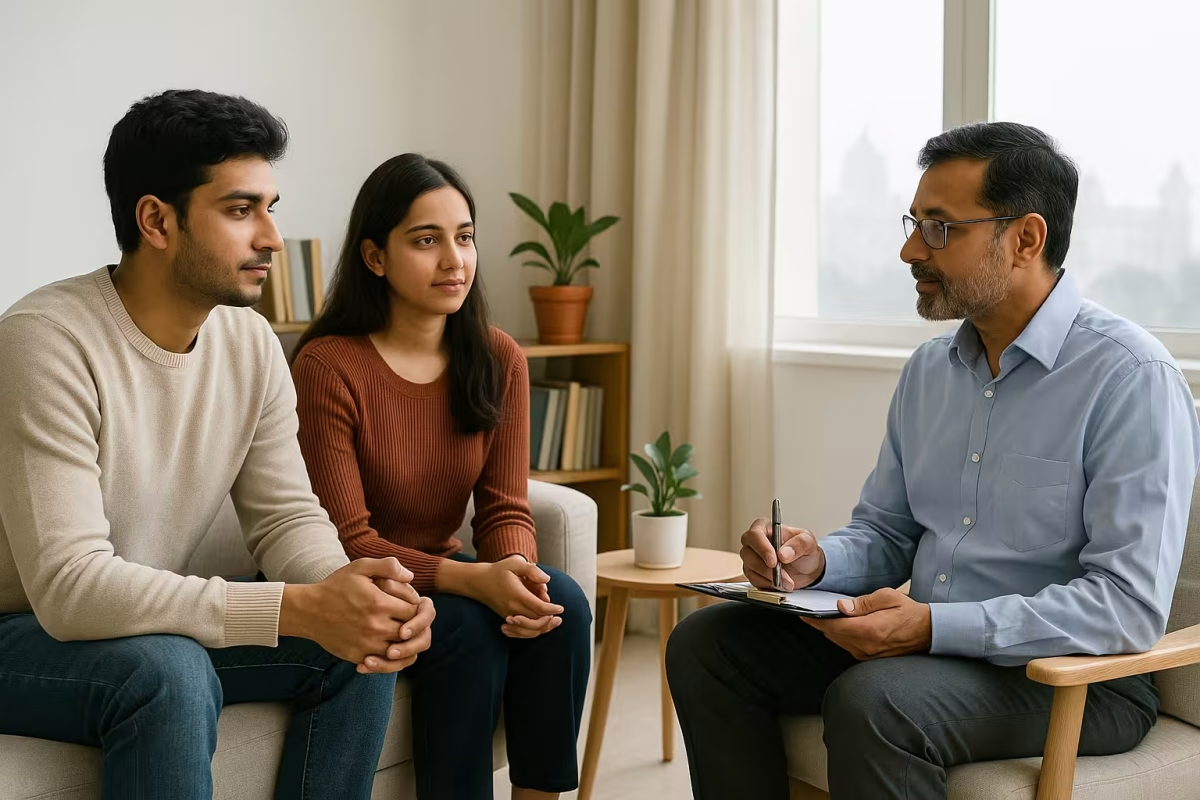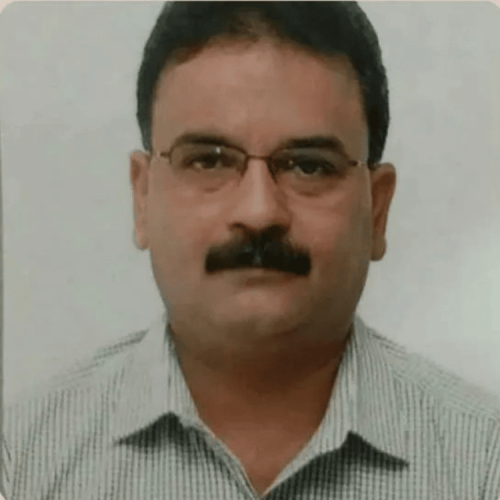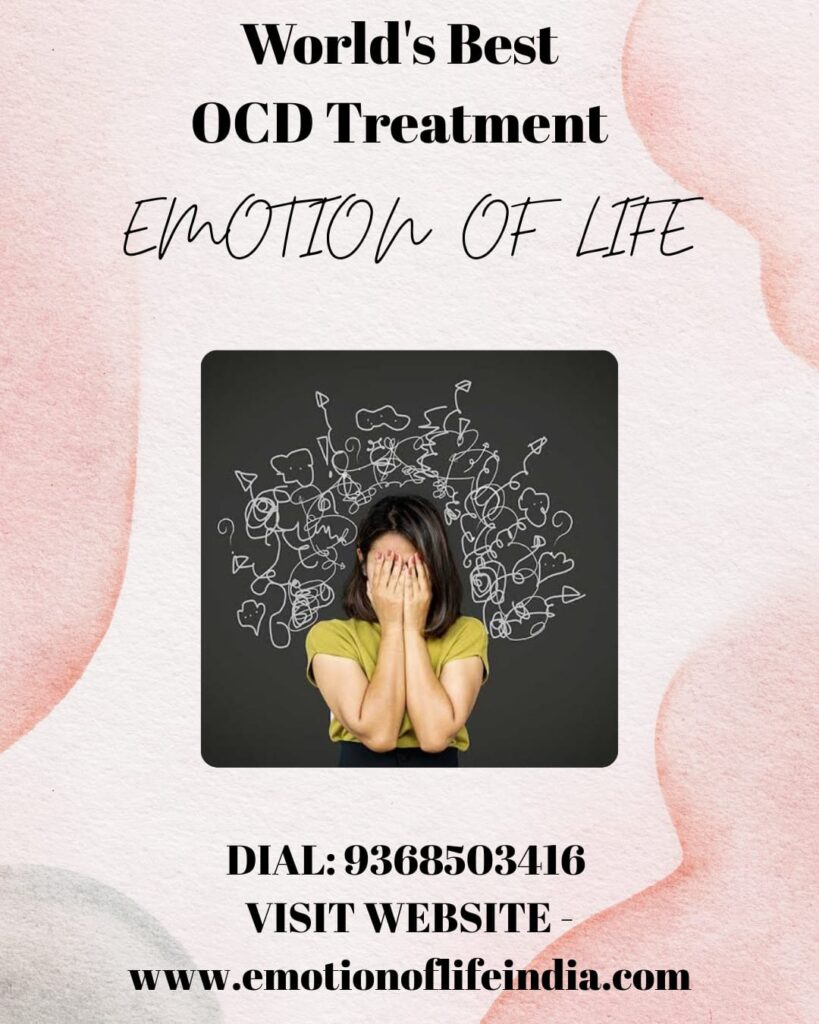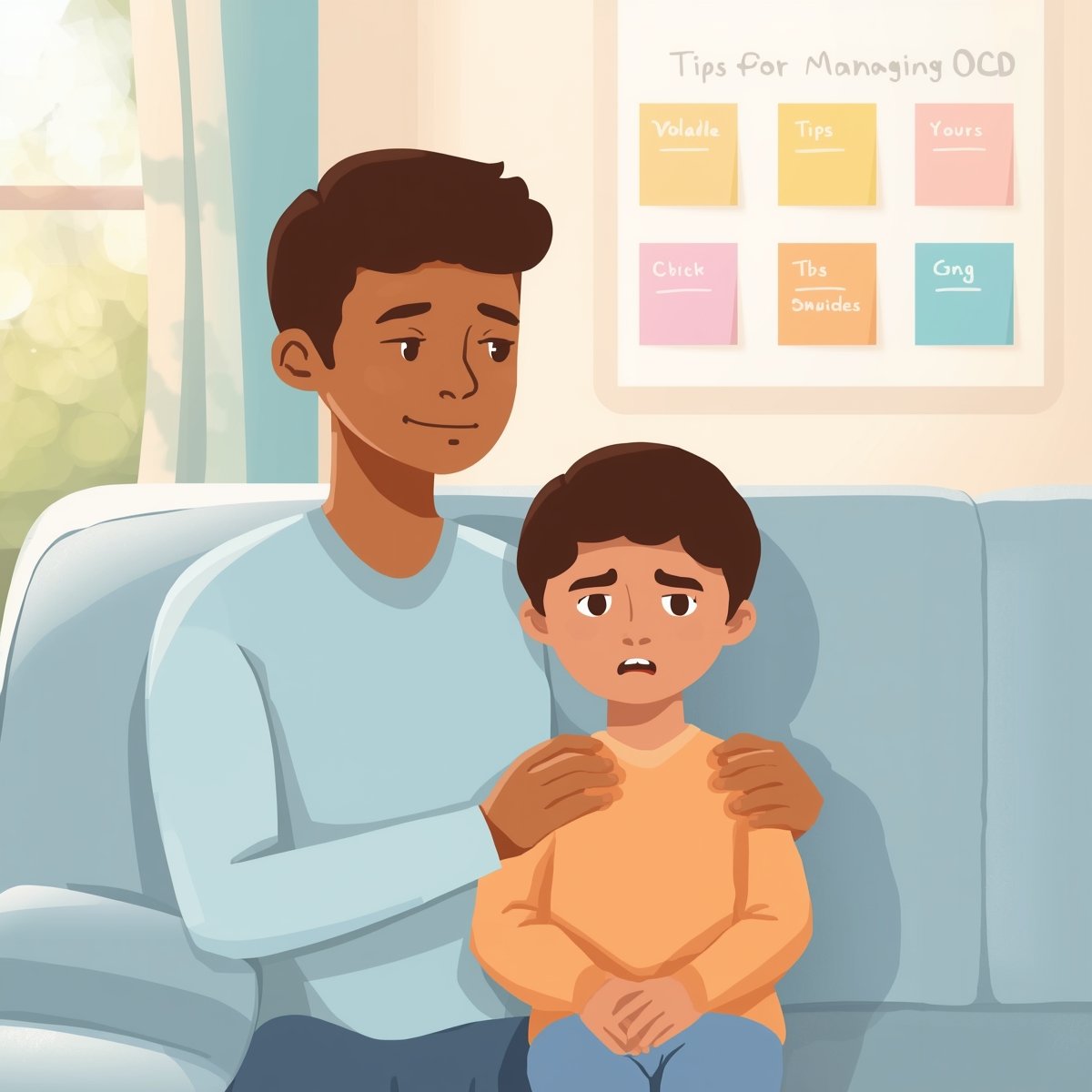You ever find yourself double-checking things again and again like that one gas knob or a door lock and still not feeling sure? Feels silly, right? But it’s exhausting too. A lot of people in Indore go through that every day without even realizing it’s part of something called OCD – obsessive-compulsive disorder.
It’s not just “overthinking.” It’s when your mind gets stuck in a loop one thought, one fear, one doubt that just keeps playing like background noise you can’t turn off. Here’s the thing: OCD isn’t about being extra careful or clean. It’s about your brain confusing “possibility” with “danger.”You get a scary thought, you do something to calm down maybe wash, check, or repeat and for a second it feels okay. Then it’s back.
At Emotion of Life, we see this every day. And we help people break that loop not with pills, but with therapy that actually changes how your brain reacts to fear. Using CBT (Cognitive Behaviour Therapy) and ERP (Exposure and Response Prevention), you learn to handle anxiety without rituals or medication.
“You don’t have to fight your thoughts. You just need to see they don’t control you.”
The Growing Need for OCD Awareness and Treatment in Indore
Why OCD Often Goes Unnoticed in Busy City Life
Let’s be real life in Indore runs fast. Work, studies, family everything happens at once. So when someone feels anxious or starts checking things too much, they call it stress or habit. But sometimes, it’s OCD quietly taking charge. Globally, OCD affects around 2% of the population, making it one of the top 10 disabling mental disorders worldwide.
And because nobody talks much about it, most people think it’s “just how I am.”
But it’s not a personality thing it’s a pattern your brain learned. And with the right therapy, it can be unlearned.
How Early Therapy Can Prevent Long-Term Struggles
Here’s something most people don’t realize OCD grows with silence. The more you avoid those thoughts, the louder they get. Therapy, especially early therapy, changes that. Studies show that people who begin CBT within the first year of symptom onset recover up to 40% faster than those who delay treatment. When you start treatment early, you catch the loop before it becomes part of your lifestyle. You learn how to calm your mind before it controls your choices.
We’ve worked with students from Palasia who couldn’t focus because of checking habits, and professionals from Vijay Nagar who kept replaying the same “what if” thoughts all day. Once therapy began, they learned to respond differently, slowly, calmly, confidently.
Understanding OCD – What It Really Feels Like
Obsessions, Compulsions, and the Mind’s Endless Loops
Imagine your brain stuck on “repeat.” You know it’s not helping, but you can’t hit stop. That’s what OCD feels like.
You get a thought like “What if I didn’t lock the door?” or “What if I hurt someone?” To make it go away, you do something, check again, pray, clean, or repeat words in your head. It helps for a bit, then the thought comes back, stronger this time.
That’s the obsession-compulsion loop. And it’s not because you’re weak it’s because your brain is trying to protect you the wrong way. At Emotion of Life, we help people in Indore recognize that pattern and unlearn it through simple, structured therapy. Once you understand what’s happening inside your mind, you start feeling in charge again.
“OCD isn’t about control. It’s about fear pretending to be logic.”
Common Signs of OCD We See in Clients Across Indore
Everyone’s OCD looks different. Some people have visible rituals; others fight silent mental battles.
Here’s what we often see during therapy sessions:
- Repeated washing or cleaning, even when it’s not needed.
- Checking doors, locks, or appliances again and again.
- Replaying small mistakes for hours in your head.
- Feeling guilty for no reason.
- Asking for reassurance from others too often.
- Fear of germs, bad luck, or losing control.
If any of this sounds familiar, don’t worry it doesn’t mean something’s “wrong” with you.
It just means your brain has learned to link fear with safety behaviours.
Therapy helps you break that link gently, naturally, and permanently.
Therapy for OCD in Indore – A Better Path Than Medication
The Power of CBT and ERP in Treating OCD Naturally
Here’s the truth OCD isn’t caused by a lack of pills. It’s caused by a pattern your brain keeps repeating.
That’s why therapy works better than medicine.
Medicine can make you calm for a while. Therapy teaches you how to calm yourself. CBT and ERP, the two therapies we use, are proven worldwide as the most effective treatments for OCD.
Here’s how they help:
- CBT makes you aware of the thoughts that drive your anxiety. You learn to see them as thoughts not facts.
- ERP teaches you to face those thoughts without reacting or doing rituals. The fear fades on its own.
Clients from Rajendra Nagar, Bhanwar Kuan, and Old Palasia tell us the same thing:
“The thoughts still come but now, they don’t control me.”
And that’s real recovery not silence, but peace.
“You can’t always stop thoughts, but you can stop believing every one of them.”
Why Therapy Works When Pills Only Manage the Symptoms
OCD Treatment in Indore focuses on helping individuals overcome anxiety and obsessive thoughts without depending on medication. While pills can temporarily reduce symptoms, they don’t teach your brain how to build new, healthier habits. That’s where therapy plays a vital role.
Through CBT (Cognitive Behavioural Therapy) and ERP (Exposure and Response Prevention), you learn to face anxiety calmly and allow it to fade naturally without reacting to intrusive thoughts. In professional OCD therapy sessions in Indore, clients gradually regain control, confidence, and emotional balance. The progress achieved through therapy stays for life with no withdrawal, no side effects, just a calmer and stronger version of yourself. At Emotion of Life, we believe real healing happens when you understand why you’re better, not just feel better. That’s what makes our therapy-based OCD recovery in Indore different from medication it helps you retrain your brain for lasting peace.
Inside Our Cognitive Behaviour Therapy (CBT) Sessions
How CBT Rewires Thought Patterns and Reduces Anxiety
Here’s the thing, OCD isn’t really about thoughts; it’s about how seriously you take them.
CBT (Cognitive behavioural therapy) helps you step back and see your thoughts for what they are just thoughts.
Let’s say your brain says, “What if I left the gas on?” or “What if something bad happens?”
CBT teaches you to pause and say, “Okay, that’s just my anxiety talking. I don’t need to act on it.”
In therapy, we break down how your thoughts, feelings, and actions connect.
You start spotting the pattern how one small fear turns into a loop.
Once you see it clearly, you learn to respond differently.
Clients often tell us, “It’s like finally understanding my own mind.” And honestly, that’s what CBT does it gives you clarity. When you stop treating every fear like a threat, anxiety starts losing power. Clinical data shows that over 59% of patients achieve remission after structured CBT sessions.
“The goal of CBT isn’t to silence your thoughts it’s to stop them from running your life.”
What to Expect During a CBT Session for OCD in Indore
Most people feel nervous before their first session. But after five minutes, it just feels like a conversation.
Here’s what usually happens at Emotion of Life:
- You share what situations trigger anxiety or repetitive behaviour.
- The therapist helps you understand the thinking patterns behind them.
- You work together to find new ways to respond next time.
- You practice small mindset shifts between sessions and talk about what changed.
There’s no pressure. No “homework” that overwhelms you. Everything happens at your pace.
People from areas like Geeta Bhawan or Vijay Nagar often say therapy fits easily into their schedule one hour a week that quietly changes everything.
Exposure and Response Prevention (ERP) – Facing Fear the Right Way
Step-by-Step ERP Process Tailored for Every Client
If CBT helps you understand your fears, ERP helps you face them slowly and safely.
It’s not about forcing anything. It’s about teaching your brain that you can handle discomfort without rituals.
Here’s how ERP usually works:
- We start by mapping what triggers your anxiety.
- Then, we create a “fear ladder” from easiest to hardest situations.
- You face one situation at a time while resisting the old compulsions.
- You realize something big the anxiety fades on its own.
Each person’s process is different. Some start small, some jump right in.
But the goal stays the same helping you live freely again, without fear calling the shots.
Clients from Saket Nagar and Sudama Nagar often share how ERP helped them sleep peacefully for the first time in years.
“ERP doesn’t make fear disappear it teaches you that fear was never the boss.”
Real Examples of ERP Helping People Regain Control
Let me tell you a few real ones:
- A client who washed hands twenty times a day now washes once and feels calm.
- Another used to recheck locks ten times; now he checks once and walks away without anxiety.
- One client who feared saying something “wrong” in meetings now speaks freely and nothing bad happens.
ERP builds courage slowly. Each small win tells your brain, “See? You’re safe.”
Over time, that becomes your new normal.
Anxiety and OCD Counselling in Indore – Healing the Emotional Side
Here’s what people don’t realize, OCD isn’t just mental, it’s emotional.
There’s guilt, fear, confusion and sometimes frustration from the people around you who don’t understand.
That’s where counselling helps.
It gives you a space to talk without judgment.
You can let out what you’ve been holding in for years the doubt, the guilt, the “why can’t I stop this?” feeling.
Our counselling sessions help you:
- Understand how emotions drive OCD.
- Talk about your struggles without shame.
- Learn emotional tools to calm your mind during triggers.
- Teach your family how to support you, not pressure you.
Many families in Indore, after attending counselling, say, “We finally get it now.”
Because once understanding replaces judgment, healing becomes much faster.
Personalised Counselling Formats for Individuals, Couples, and Families
No two people experience OCD the same way so we don’t use a one-size-fits-all plan. We offer different counselling options based on your life:
- Individual Counselling: For personal growth and emotional clarity.
- Couple Counselling: For partners struggling to handle reassurance or relationship-related OCD.
- Family Counselling: To help loved ones learn how to support recovery the right way.
You can choose between online or in-person sessions. Most people in Indore prefer online sessions they’re private, comfortable, and easy to attend.
Online OCD Therapy – Convenient and Effective for Indore Residents
How Online Sessions Maintain Privacy and Consistency
Between traffic and busy schedules, showing up in person can be tough.That’s why online therapy works so well for people in Indore. It’s the same therapist, same care just from your home. You get live video sessions, guided ERP exercises, and regular progress updates. Everything is confidential, structured, and flexible. Most clients say online therapy feels even easier to open up you’re in your own space, feeling safe and relaxed.
Areas and Localities We Serve in and Around Indore
Our therapy sessions reach people across Indore – from Vijay Nagar, Palasia, and Rajendra Nagar to Bhanwar Kuan, Tilak Nagar, and Geeta Bhawan. We also support clients in Dewas, Mhow, and Rau through online sessions. So, no matter where you stay, expert help is just one video call away.
Real OCD Recovery Stories from Indore
Case 1 – Overcoming Checking OCD with ERP Practice
Ravi, an engineer from Vijay Nagar, used to check the doors twenty times every night. Through ERP, he learned to resist the urge and sit through the anxiety. Now he checks once and sleeps peacefully.
“For the first time in years, I feel safe even when I don’t check.”
Case 2 – Healing Relationship OCD Through Counselling
Mitali, from Palasia, used to constantly doubt her relationship asking for reassurance again and again. Therapy helped her understand that uncertainty doesn’t mean danger. Now she trusts her feelings and enjoys calm instead of chaos.
“My mind finally stopped asking the same question on repeat.”
Case 3 – Rebuilding Confidence After Perfectionism OCD
Nikhil, a student from Bhanwar Kuan, couldn’t submit assignments without rechecking ten times. CBT helped him learn that mistakes don’t mean failure. Now he works with focus, not fear and it shows in his confidence.
“Good enough turned out to be more than enough.”
Frequently Asked Questions (FAQs)
Can OCD Be Treated Without Medicine
Yes, 100%. CBT and ERP are the gold standards for OCD recovery. They help you retrain your brain without pills or side effects.
How Long Does Therapy Take to Show Results?
It depends on your consistency, but most clients notice big changes in 6 to 12 sessions.
The more you practice what you learn, the faster your progress feels real.
What Makes CBT and ERP So Effective?
Because they work on the why, not just the what. CBT changes your thinking patterns. ERP changes your reactions. Together, they teach your brain that it doesn’t need to panic to feel safe.
Who Provides OCD Counselling in Indore?
Every session is led by Shyam Gupta and Pratibha Gupta, supported by our wellness and ERP mentors.
You’ll always talk to real people never an automated program.
Do You Offer Online OCD Therapy in Indore?
Yes, and it works beautifully.
Online sessions are private, guided, and just as effective as in-person therapy.
Start Your OCD Recovery Journey in Indore Today
If you’re tired of fighting the same thoughts every day, it’s okay to ask for help. You don’t need to be “strong” all the time. You just need to start. At Emotion of Life, we’ll walk with you through each step no judgment, no quick fixes, just honest, structured healing. You can recover naturally, safely, and completely without medication.
Book your Consultation call today. Tell us what’s been happening, and we’ll help you find your way back to peace.
“Peace isn’t far away. It’s just one honest conversation away.”









